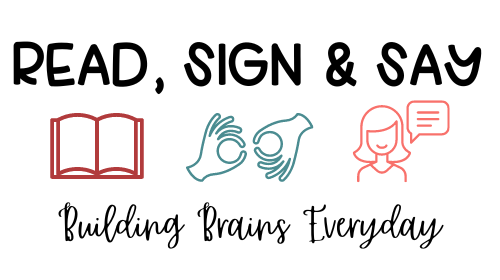Do you want your child to have strong language skills? Do you want your baby to have a large vocabulary? Do you want your child to be ready to learn to read when entering preschool? Of course, you do! Then start with the following:
TALK
- Talk to your baby beginning at birth. It may feel silly and strange. It is VALUABLE and costs you NOTHING but time.
Talk to him when you are dressing him. Narrate (and sign) what you are doing. For example, “We are going to put on your clothes. First, we will change your diaper, then we will put on your outfit. Let’s lift your leg to put on your pants”… and so on.
Narrate what you are doing while your infant is watching you. I can remember my sitting my little one in her bouncer seat while I was cooking dinner. I would tell my four months old everything I was doing while preparing dinner. It was a one-sided conversation about cooking squash but that is ok. I was providing an opportunity for her to hear the language spoken and shared.
When your little one becomes a toddler, narrate their play. Talk to them about what they are engaged in. If they are playing with blocks, narrate what they are doing at that moment. “You are using red and blue blocks to build your tall tower. Oh no! Down comes the tower!”, This creates a meaningful language-rich environment
Language skills begin developing before birth. Research shows that newborns show a preference for their mother language and voice. Your baby knows your voice and the voices that have been around her while in the womb. I can remember a video of my firstborn laying on the bassinet in the hospital nursery minutes after birth waiting to be examined and bathed for the first time. She was so upset. Her Daddy (a first-time father) gently put his hand on her chest and spoke “Hey. It’s OK.” She stopped crying. She recognized his voice. Precious.

READ
- Read to your baby! Then read some more!
Reading to your baby and toddler introduces so many aspects of the spoken language. They are exposed to new vocabulary, rhyming, and phonics. In addition to reading the book, stop and ask questions to check comprehension. If the story has a lot of repetition, pause and allow your little one to finish the sentence with the repetitive word. Discuss the illustrations on each page. All of this will expose your little one to new words and sounds. Many times, your toddler will ask to read the same book over and over. That is ok. Follow his lead. Read the literature that he is engaged in.
SING
- Sing, Sing and Sing Some More!
Singing to your little one helps to equip the brain to tune in to literacy skills at an earlier age. Singing increases vocabulary and strengthens their auditory memory. Hearing songs builds the skill of auditory discrimination such as phonics and rhyming words. All of this contributes to a great start to literacy prior to entering school. Singing to your infant and toddler doesn’t cost you a dime. You simply learn a few silly songs and sing your heart out. At home, in the car, everywhere! Your little one will love it!
SIGN
- Sign, Sign and Sign Again!
Using Baby Sign Language along with spoken words will significantly impact your little one’s language skills. Researchers compared two groups of infants. One group was exposed to sign language and another group was exposed to only speech. The findings showed that the group exposed to sign language had improved overall verbal language development. Signing with your baby is easy. You simply learn a few words in sign language that are meaningful to your baby, such as “milk”. You use the sign every time you speak the word “milk” Your knowledge of signs can grow with your baby. Remember, you are not signing complete sentences. Only specific vocabulary words that are meaningful to the little one.
Think about this… you can SIGN when reading and singing to your infant or toddler. Just sign those keywords that your baby is learning. Wow! It only takes small intentional investments of our time to help our little ones have the best start!
Would you like to learn more about Baby Sign Language and other ways to help develop your baby’s language skills? Click here to get your free guide to Infant Brain Development Tips.

